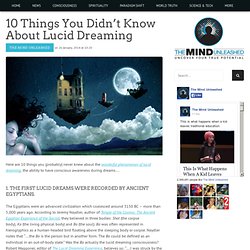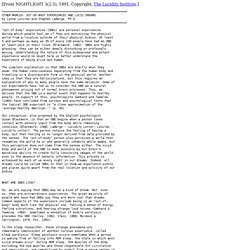

What Did Abraham Lincoln Dream About? 8 Stories of Famous Dreams. Perhaps the most famous dream of all: Shakespeare's A Midsummer Night's Dream, as imagined by John Simmons in 1873.

(Photo: Public Domain/WikiCommons) This is part three of a five-part series on sleep and dreams, sponsored by Oso mattresses. Read the two here and here. In the 18th century, many Americans were dubious of dreams, considering them to be products of bad indigestion or possible portents of mental illness, and were not likely to record or analyze them. This changed over the course of the 19th century, when people began to think of dreams as omens of things to come, or portals to an inner world. In other words, it became cool to start telling people your dreams. In his book Lincoln Dreamt He Died: The Midnight Visions of Remarkable Americans from Colonial Times to Freud, historian Andrew Burstein chronicles this transformation in attitudes.
Abigail Adams confided her dreams to her husband John Adams. Abigail to John Adams, January 1, 1797. 10 theories that explain why we dream. Kinja is in read-only mode.

We are working to restore service. I like #7 and #8 of sorts, as they sort of fit in with the kinds of dreams I have. Fixing things, solving thing, experimenting with situations, and learning. That said, I know that differs a lot from the kind of dreams I probably had as a child, so there really can't be a single answer to this I guess. 10 Things You Didn’t Know About Lucid Dreaming. Here are 10 things you (probably) never knew about the wonderful phenomenon of lucid dreaming, the ability to have conscious awareness during dreams… 1.

The first lucid dreams were recorded by Ancient Egyptians. The Egyptians were an advanced civilization which coalesced around 3150 BC – more than 5,000 years ago. According to Jeremy Naydler, author of Temple of the Cosmos: The Ancient Egyptian Experience of the Sacred, they believed in three bodies: Shat (the corpse body), Ka (the living physical body) and Ba (the soul). Ba was often represented in hieroglyphics as a human-headed bird floating above the sleeping body or corpse. “For lucid dreamers, trance journeyers and OOBE-ers, the Ba may represent in a historic sense, the first depiction of a ‘mobile awareness’ separated from the physical host. 2.
One possible reason for this is that children are more prone to nightmares which can be highly vivid and emotionally intense. 3. Out-Of-Body Experiences and Lucid Dreams. [From NIGHTLIGHT 3(2-3), 1991, Copyright, The Lucidity Institute.] ======================================================================== OTHER WORLDS: OUT-OF-BODY EXPERIENCES AND LUCID DREAMS by Lynne Levitan and Stephen LaBerge, Ph.D. ======================================================================== "Out of body" experiences (OBEs) are personal experiences during which people feel as if they are perceiving the physical world from a location outside of their physical bodies.

At least 5 and perhaps as many as 35 of every 100 people have had an OBE at least once in their lives (Blackmore, 1982). OBEs are highly arousing; they can be either deeply disturbing or profoundly moving. Understanding the nature of this widespread and potent experience would no doubt help us better understand the experience of being alive and human. 15 Interesting Facts about Dreams. Dreaming is one of the most mysterious and interesting experiences in our lives. During the Roman Era some dreams were even submitted to the Roman Senate for analysis and dream interpretation.
They were thought to be messages from the gods. Dream interpreters even accompanied military leaders into battles and campaigns! What It’s Like to Be an Expert Lucid Dreamer. “My dreams leave impressions that are as strong or stronger than anything I experience when I’m awake.”

By Alexa Tsoulis-Reay It’s estimated that most people will have a lucid dream — one in which they are aware that they are asleep and might have some measure of control over their actions — at least once in their life. But there are those who claim to “get lucid” much more frequently. Lucid Dreamers Are Better Problem-Solvers. Lucid dreamers are those lucky individuals who are aware that they’re dreaming and are able to control what happens in their dreams.

(Jump off a cliff and soar through the air? Sure. Walk across the ocean? Go for it!) It’s an ability that must make the dreaming hours more interesting, and now some new research suggests some waking-life benefits, too. Previously, research has shown that frequent lucid dreamers are better at common tasks used in psychology studies, such as the Stroop test (in which, for example, the word green is written in blue ink and participants have to name the color, not the word). In this study, the participants who reported frequent lucid dreams were better at the task than those who occasionally or rarely experienced lucid dreams.
What the paper didn’t demonstrate, however, was causality — in other words, you can’t necessarily expect that if you train yourself to become a lucid dreamer, you’ll also get better at this kind of problem solving.